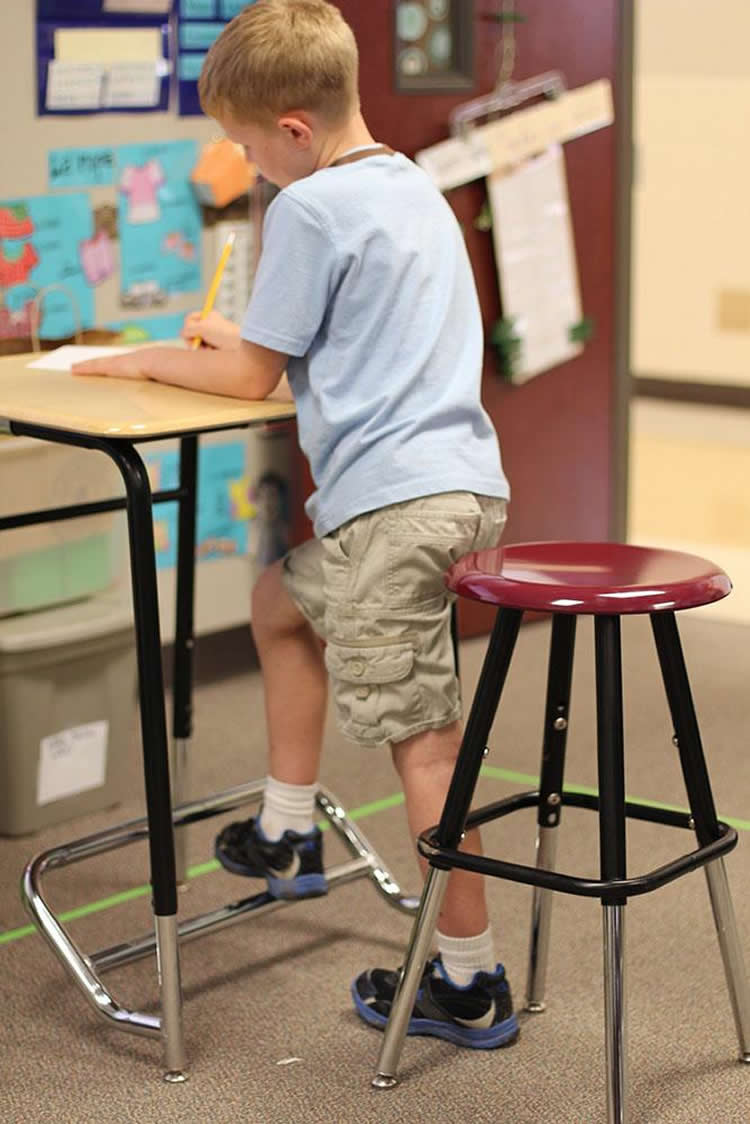Texas A&M study finds we think better on our feet, literally.
A study from the Texas A&M Health Science Center School of Public Health finds students with standing desks are more attentive than their seated counterparts. In fact, preliminary results show 12 percent greater on-task engagement in classrooms with standing desks, which equates to an extra seven minutes per hour of engaged instruction time.
The findings, published in the International Journal of Health Promotion and Education, were based on a study of almost 300 children in second through fourth grade who were observed over the course of a school year. Engagement was measured by on-task behaviors such as answering a question, raising a hand or participating in active discussion and off-task behaviors like talking out of turn.
Standing desks – also known as stand-biased desks – are raised desks that have stools nearby, enabling students to sit or stand during class at their discretion. Mark Benden, Ph.D., CPE, associate professor at the Texas A&M Health Science Center School of Public Health, who is an ergonomic engineer by trade, originally became interested in the desks as a means to reduce childhood obesity and relieve stress on spinal structures that may occur with traditional desks. Lessons learned from his research in this area led to creation of Stand2Learn™, an offshoot company of a faculty-led startup that manufactures a classroom version of the stand-biased desk.

Benden’s previous studies have shown the desks can help reduce obesity – with students at standing desks burning 15 percent more calories than students at traditional desks (25 percent for obese children) – and there was anecdotal evidence that the desks also increased engagement. The latest study was the first designed specifically to look at the impact of classroom engagement.
Benden said he was not surprised at the results of the study, given that previous research has shown that physical activity, even at low levels, may have beneficial effects on cognitive ability.
“Standing workstations reduce disruptive behavior problems and increase students’ attention or academic behavioral engagement by providing students with a different method for completing academic tasks (like standing) that breaks up the monotony of seated work,” Benden said.
“Considerable research indicates that academic behavioral engagement is the most important contributor to student achievement. Simply put, we think better on our feet than in our seat.”
The key takeaway from this research, Benden said, is that school districts that put standing desks in classrooms may be able to address two problems at the same time: academic performance and childhood obesity.
About this psychology research
Additional Texas A&M researchers involved with the study, which was funded by the National Institutes of Health, were Hongwei Zhao, Ph.D., professor of epidemiology and biostatistics at the Texas A&M School of Public Health; Jamilia Blake, Ph.D., assistant professor of educational psychology at the Texas A&M College of Education; and Marianela Dornhecker, doctoral student in educational psychology at the Texas A&M College of Education. Monica Wendel, Dr.P.H., associate dean for public health practice at the University of Louisville, also contributed to the research.
Funding: The research was supported by the National Institutes of Health.
Source: Ellen Davis – Texas A&M
Image Credit: The image is credited to Texas A&M Health Science Center
Original Research: Abstract for “The effect of stand-biased desks on academic engagement: an exploratory study” by Marianela Dornhecker, Jamilia J. Blake, Mark Benden, Hongwei Zhao and Monica Wendel in International Journal of Health Promotion and Education. Published online April 21 2015 doi:10.1080/14635240.2015.1029641
Abstract
The effect of stand-biased desks on academic engagement: an exploratory study
Schools have been suggested as a viable avenue to combat childhood obesity. School administrators are sometimes faced with the conflicting demands of improving the health of their students and maintaining academic performance. Dynamic furniture such as stand-biased desks may be one way to address both academic and health demands placed on schools to prevent childhood obesity. Classrooms with stand-biased desks were compared with classrooms using traditional seated desks in 2nd, 3rd, and 4th grades. The academic engagement of 282 participants was observed in the fall and spring during one academic year. The engagement of the treatment classrooms was compared with the engagement of the control classrooms. Both groups showed general increases in their academic engagement over time. Stand-biased desks do not seem to result in adverse effects on academic engagement when used in elementary classrooms. The data suggest promising results for the use of stand-biased desks in elementary school classrooms. The results suggest that stand-biased desks can be introduced in the classroom to combat childhood obesity through increasing energy expenditure without affecting academic engagement.
“The effect of stand-biased desks on academic engagement: an exploratory study” by Marianela Dornhecker, Jamilia J. Blake, Mark Benden, Hongwei Zhao and Monica Wendel in International Journal of Health Promotion and Education. Published online April 21 2015 doi:10.1080/14635240.2015.1029641







